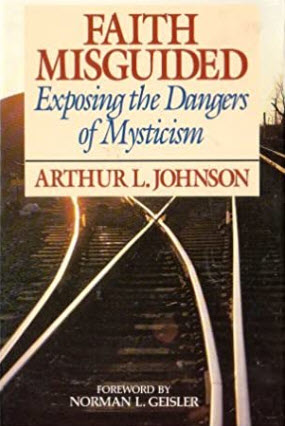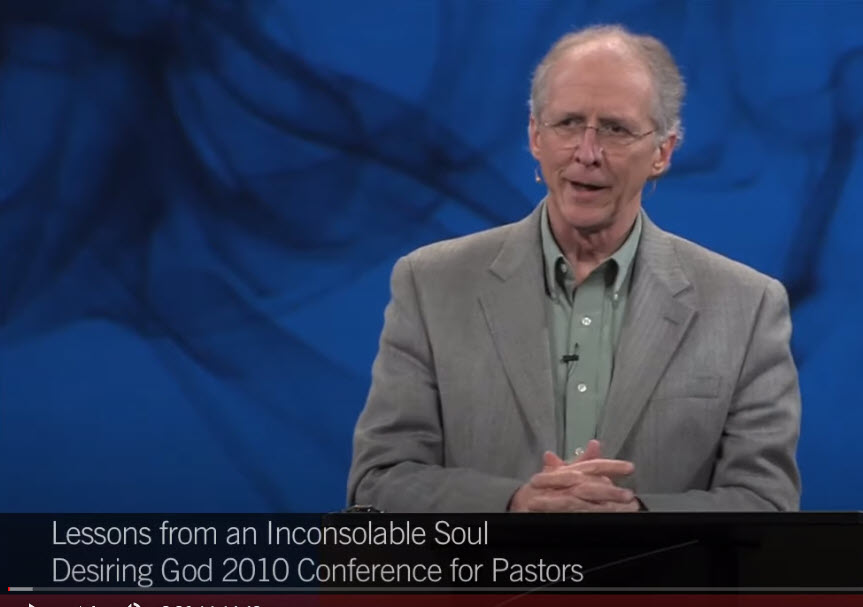Piper at Passion 2020
John Piper’s address at Passion 2020, entitled ‘Live for Your Greatest Desire—Jesus’, illustrates the central role that ‘desire’ plays in his ministry. He mentions the word over 90 times, concluding with the idea that the awakening of a supreme desire in God opens the pathway to the new birth. He explains his view of the new birth as follows: ‘To be born again is to taste that God is more to be desired than anything; that’s what it means to be born again. The creation of a desire for God greater than the desire for anything else, is to be a Christian.’ The concept of a ‘supreme desire for God’ is an inner subjective emotion, which lies at the heart of Piper’s message.
Eastern Religion
Desire is central to Buddhist teaching. ‘All phenomena, the Buddha once said, are rooted in desire. Everything we think, say, or do—every experience—comes from desire. Even we come from desire. We were reborn into this life because of our desire to be… The path that takes you to nirvana is rooted in desire—in skilful desires… Basic in everyone is the desire for happiness.’

The Buddha ‘imagined the ultimate happiness—one so free from limit and lack that it would leave no need for further desire—and then treasured his desire for that happiness as his highest priority’. The noble truths of Buddhism give two roles to desire, depending on whether it’s skilful or not. Unskilful desire is the cause of suffering. ‘Skilful desire undercuts unskilful desire, not by repressing it, but by producing greater and greater levels of satisfaction and well-being so that unskilful desire has no place to stand… The desires he recommends really do produce a happiness that can give you the strength to keep on choosing the skilful path.’[1]
Sadhguru is a Hindu mystic with a worldwide movement; he designed the massive Adiyogi statue of the Hindu God Shiva. Sadhguru refers to desire as a wonderful vehicle for making contact with The Ultimate. He teaches that the third eye, the gateway to the inner realms of higher consciousness, leads to mystical experiences. In New Age spirituality, the third eye often symbolizes a state of enlightenment.
So we see that in the teachings of John Piper, and the Buddha, and the Guru, desire plays a central role. Piper teaches that supreme desire in God awakens the new birth. The Buddha teaches that skilful desire produces happiness and strength to choose the skilful path. The Guru teaches that desire is a wonderful vehicle for contacting The Ultimate.
New Age teaches that a divine spark, which burns within every man, is indicative of man’s potential to be one with God. This unity with God is always achieved by an awakening of the light within. The mission of the New Age movement is ‘to share light and love with others on the planet, empowering them toward their own paradigm shift and spiritual awakening.
The purpose of this article is to show that mysticism is an essential element of John Piper’s philosophy of Christian Hedonism.
Defining Mysticism
Encyclopaedia Britannica defines mysticism as ‘the sense of some form of contact with the divine or transcendent, frequently understood in its higher forms as involving union with God’.[2]
In his book Faith Misguided: Exposing the Dangers of Mysticism (1988), Professor Arthur Johnson shows how ‘many truths of Scripture are being distorted by the philosophy of mysticism which places experience and emotion above the inerrant Word of God. Unfortunately, the misunderstandings spawned by mysticism have gained respectability among the evangelical community.’[3]

Johnson contends that mysticism is both anti-scriptural and a contradiction of the evangelical view that the Bible is the one and only ultimate criterion of truth about God and our relation to Him.[4] He is concerned that some evangelical Christians look with favor on forms of mysticism that are dangerous. ‘When we speak of a mystical experience, we refer to an event that is completely within the person. It is totally subjective… It is this claim that mystical experiences are ways of knowing truth that is vital to understanding many religious movements we see today.’[5]
One such religious movement is Piper’s Desiring God organization that propagates the philosophy of Christian Hedonism. His best-selling book Desiring God, first published in 1986, with many subsequent editions, teaches that ‘the ultimate ground of Christian Hedonism is the fact that God in uppermost in His own affections: The chief end of God is to glorify God and enjoy Himself forever.’[6]
Johnson says mystics claim that truth and knowledge are attainable through mystical experiences. Hence, all truth is to be tested by inner, subjective impressions. A Christian mystic equates his inner subjective states with the voice of God. He claims to have experienced God; he tends to believe that the activity of the Holy Spirit within is expressed primarily through emotions; this may take the form of a feeling of ‘union with God’.[7] Some mystics, like Piper, claim, as we see in this article, that God has revealed Himself directly to them—they have heard the voice of God speaking personally to them.
Johnson writes: ‘Mysticism, as I have defined it, has as its essential element a certain deep trust in inner, subjective feeling states, which are seen as both good and valuable in themselves and as truth-bearing…[8] I have also argued that the Christian should reject mystical experiences, because God has chosen to relate to man by means of man’s mind, not through his emotions… to be a mystic is itself an open door to false doctrine.’[9]
Piper’s Awakening
As a young man, Piper was awakening to the ‘truth’ of Christian Hedonism by his mentor, Blaise Pascal. When he discovered his ‘truth’ that ‘God is most glorified in us when we are most satisfied in Him’, Piper says he was freed from the unbiblical bondage of fear that it is wrong to pursue joy. His overwhelming quest for happiness is not just permitted but required. He writes: ‘This was almost too good to be true—that my quest for joy and my duty to glorify God were not in conflict.’[10] Indeed, God’s divine happiness ‘is the fountain from which the Christian Hedonist drinks and longs to drink more deeply… The aim of the Christian Hedonist is to be happy in God.’[11] To drink at the fountain of divine happiness is a subjective mystical experience. Mysticism is an essential element of Christian Hedonism which claims to provide a way into the secret of everlasting pleasure in God.
The force of Piper’s mystical awakening was so overwhelming, and so deeply emotional, that it changed his entire life. ‘All those years I had been trying to suppress my tremendous longing for happiness… but now it started to dawn on me that this persistent and undeniable yearning for happiness was not to be suppressed—but glutted on God.’[12] With the ideas of Christian Hedonism firmly implanted in his mind, Piper turned to the Psalms and says he found the language of hedonism everywhere. Having seen the ‘light’ within, Piper says he reread the Bible, ‘to give it a chance to have its true say. And what I found there concerning joy changed me forever. I have been trying to understand it, and live it, and teach it, ever since. It’s not new. It’s been there for thousands of years. I thank God today for Pascal’s part in my awakening.’[13] But Piper has committed a cardinal error by starting with the wisdom of men and not with Scripture. He is reading the Word of God through the lens of Christian Hedonism, searching for verses to support his hedonistic philosophy. If he had started with Scripture, there would be no such thing as Christian Hedonism.
In his article, ‘Have You Tasted God Himself?’ (2016), Piper thanks God ‘that over sixty years ago, he entered my life, and gave me a new heart. I thank him that for over sixty years, he has awakened, and reawakened countless times, a taste for the moral beauty of divine things.’[14] Piper’s awakened taste for divine moral beauty is a completely subjective experience.
Christian Hedonism is based on Piper’s subjective inner belief that the purpose of the Christian life is to achieve maximum happiness in God. His inner source of knowledge about the things of God places great importance on feelings and emotions. The ruling force in Piper’s awakened ministry is Christian mysticism.
We must conclude that Piper’s hedonism is a man-made philosophical system, based on mysticism, that comes from the ideas of CS Lewis and Blaise Pascal. He is thankful to Pascal for awakening him to spiritual truths that satisfied his great longing for happiness.
The Feast of Christian Hedonism
Piper writes in Desiring God: ‘I thank God that again and again He has awakened my heart to desire Him, to see Him and to sit down at the feast of Christian Hedonism and worship the King of Glory.’[15] In his mystical thinking, Piper imagines himself participating in a heavenly hedonistic feast.
In his book Hunger for God: Desiring God through fasting and prayer (1997), Piper writes: ‘There is an appetite for God. And it can be awakened. I invite you to turn from the dulling effects of food and the dangers of idolatry, and to say with some simple fast: “This much, O God, I want you”.’[16] But Scripture denies any ‘appetite for God’ to be awakened in man. ‘The natural man does not receive the things of the Spirit of God, for they are foolishness to him’ (1 Corinthians 2.14). Indeed, the natural man suppresses the truth of God in unrighteousness with the wrath of God over him because of his sin (Romans 1.18). Man is at enmity with God (James 4.4) and ‘no one seeks after God, no, not one’ (Romans 3.10-11). Piper is outside of Scripture in describing man as having an appetite for God.
In When I Don’t Desire God: How to Fight for Joy (2004), Piper says he is finding evidence all over the Bible that the pursuit of joy in God, and the awakening of all kinds of spiritual affections, are part of the essence of the new-born Christian heart. ‘This discovery excites me and frightens me. I want this. But I fear I don’t have it. In fact, as far as I can see, it is outside my power to obtain. How do you get a desire that you don’t have and you can’t create? Or how do you turn the spark into a flame so that you can be sure it is pure fire?”[17]
Piper declares that by seeing the glory of Christ in the gospel we are changed. ‘What is this internal change that comes from “beholding the glory of the Lord”? It is the awakening of joy in Christ himself, and all that God is for us in him. It is the awakening of a new taste for spiritual reality centering in Christ.’[18]
The phrase ‘centering in Christ’— a term common in New Age thinking, is used by Piper, but never in the Bible. Centering practices are intended to disengage the mind from the normal waking state and take it into a state of deep relaxation. Centering meditation helps to collect scattered energies and bring them back to the calm place within.
Piper writes: ‘Our chief end is to glorify God, the great Object. We do so most fully when we treasure him, desire him, delight in him so supremely that we let goods and kindred go and display his love to the poor and the lost.’[19]
But the Bible speaks about glorifying God in a vastly different way. Jesus taught that God is glorified by the good works of his disciples: ‘Let your light shine before men in such a way that they may see your good works, and glorify your Father who is in heaven’ (Matthew 5.16). Our Lord also said that God is glorified by the fruitfulness of his disciples. ‘Herein is my Father glorified, that ye bear much fruit; so shall ye be my disciples’ (John 15.8). Paul prayed that the Philippian church might be ‘filled with the fruit of righteousness which comes through Jesus Christ, to the glory and praise of God’ (Philippians 1.8-11).
Piper and the mysticism of CS Lewis
C.S. Lewis has had a massive impact on Piper’s life and ministry. Piper even refers to Lewis as his hero. In a sermon entitled, ‘Lessons from an Inconsolable Soul: Learning from the Mind and Heart of C.S. Lewis’, Piper expresses his profound admiration for Lewis: ‘He helped me become alive to life… He made me more alive to beauty. He put my soul on notice that there are daily wonders that will waken worship if I open my eyes. He shook my dozing soul and threw the cold water of reality in my face, so that life and God and heaven and hell broke into my world with glory and horror…’[20] Piper’s expression ‘wonders that waken worship’ is mystical terminology. He admits that the extra-biblical wisdom of C.S. Lewis played an important role in opening his mind to the ‘truth’ of Christian Hedonism.
Piper is ecstatic about the amazing influence that Lewis has had on his life: ‘I find both my heart and my mind awakened and made more alive and perceptive and responsive and earnest and hopeful and amazed and passionate for the glory of God every time I turn to C.S. Lewis.’[21]
And Piper again: ‘He helps me to awaken my dazed soul so that the realities of life and of God and heaven and hell are seen and felt.’ Lewis awakens Piper’s dazed soul to the realities of life and helps him to ‘see and feel’ God. Piper is deeply thankful to Lewis for bringing his subjective mystical emotions to life.
Here we should note that C.S. Lewis was deeply mystical in his writings and philosophy of life. Indeed, his theory of mythology is essential to an understanding of his entire range of work.[22] He was an Anglo-Catholic who believed the Bible contained errors and that some books of the Old Testament were based on legend and myth. He wrote: ‘The earliest stratum of the Old Testament contains many truths in a form which I take to be legendary, or even mythical—hanging in the clouds, but gradually the truth condenses, becomes more and more historical.’[23] Lewis’ idea of truth ‘hanging in the clouds’ is profoundly mystical. He called the Christ story a ‘true myth’, and he believed that even pagan myths express spiritual truths. Piper felt completely at one with the mystical writings of Lewis.
Emotions and Feelings
In Desiring God, Piper says, ‘we are converted when Christ becomes for us a Treasure Chest of holy joy’ and, ‘So the faith that pleases God is the assurance that when we turn to Him, we will find the all-satisfying Treasure. We will find our heart’s eternal delight’[24] Piper’s awakening to the truths of Christian Hedonism revealed to him that ‘the great Object’ is an ‘everlasting Treasure, the source of eternal joy’. To access this source, we need to cultivate a supreme desire and a taste for the beauty of God; we need a new spiritual reality centering in Christ, which enables us to turn the spark of our supreme desire into a flame of everlasting pleasure. Piper’s mystical language—‘all-satisfying treasure’, ‘our heart’s eternal delight’, ‘supreme desire’, ‘taste for beauty’, ‘centering’, ‘awakening’, and ‘everlasting pleasure’ is not useful for teaching the gospel of God.
Piper emphasises the importance of emotions in worship. He writes: ‘The engagement of the heart in worship is the coming alive of the feelings and emotions and affections of the heart. Where feelings for God are dead, worship is dead. True worship must include inward feelings that reflect the worth of God’s glory.’[25] According to Piper, worship is authentic when affections for God arise in the heart. In the moment of authentic emotion, ‘We are transported (perhaps only for seconds) above the reasoning work of the mind, and we experience feeling without reference to logic or practical implications.’[26] He has described a mystical experience in which God’s presence is so intense and personal that it cannot be described in terms of knowing or understanding. According to Jesus, true worship must be in keeping with God’s nature. ‘The true worshipers will worship the Father in spirit and truth; for the Father is seeking such to worship Him. God is Spirit, and those who worship Him must worship in spirit and truth’ (John 4.23-24).
In Dangerous Duty, Piper again emphasises the importance of emotion and feelings. ‘We are commanded to feel, not just to think or decide. We are commanded to experience dozens of emotions, not just to perform acts of willpower.’ Christian Hedonism claims that ‘emotions are commanded throughout the Bible… Therefore, Christian Hedonism is not making too much of emotion when it says that being satisfied in God is our calling and duty.’[27]
Piper’s mystical approach to worship is based on ‘authentic emotion’ and of being ‘transported’ into the presence of the false, pleasure-giving god of Christian Hedonism. But the true God of the Bible has chosen to relate to man by means of his mind, not through his emotions. God has put his law into the mind of men (Jeremiah 31.33). Believers are exhorted to know the mind of Christ (Philippians 2.5). Just as human beings can make the thoughts of their mind known to others by speech and writing, so God has communicated his thoughts to men and women in Scripture. ‘Come now, let us reason together’, says the Lord (Isaiah 1.18).
Johnson explains: ‘The repudiation of mysticism is not the denial of proper emotions. Instead, it is the assertion that reason, not emotion, is the tool for grasping and testing truth.’[28]
In his address to sixty thousand young people at Passion, Piper does not confront sin and point to the authentic gospel. A glaring omission in Piper’s message is that he says little about the sinfulness of man, and there is no call for repentance toward God. The heresy of Piper is that he presents a false, hedonist ‘god’, created in his own image, a god whose central aim is to satisfy the desires of man. This is a false gospel and Piper reveals himself to be a false teacher.
Piper and Passion Worship
We learn much about Piper’s approach to worship through his ministry to the annual Passion Conference in Atlanta.
The Passion worship experience is generated by the skilful use of psychedelic strobe lighting in a darkening auditorium packed with young people, eagerly anticipating an ecstatic rave experience. Thunderous, rhythmic rock music produces a mass of whirling bodies and waving arms. The ecstatic excitement of Passion revellers induces a state of altered consciousness that facilitates a mystical union with the ‘divine’. Added to the mix is the name Jesus, and the young people are led to believe that they are worshipping the God of the Bible.
But they have been deceived—what we see at Passion is counterfeit worship. And the terrible truth is that most of the young people at Passion actually believe that they can worship God in this way. We must conclude that the spirit of Passion is not the Spirit of God. Yet Piper is effusive in his praise of Passion worship; ‘one of the things that I love about Passion is that Passion celebrates a majestic, holy, glorious, just, beautiful God and His Son, by the Spirit’. The Passion experience is deeply mystical and provides the ideal setting for Piper to propagate his dogma of Christian Hedonism, with an offer of everlasting pleasure in God.
Piper hears God’s Voice
The final evidence of Piper’s mysticism is his claim to hear God’s voice. According to Johnson, ‘the mystic claims, either openly or by implication, that God has revealed Himself to the mystic… the religious mystic claims to have experienced God and to have received special revelations.’[29] In his article, ‘The Morning I heard God’s Voice’, Piper says God spoke to him, audibly. He claims God narrated to him several verses from Psalm 66. ‘Let me tell you about a most wonderful experience I had early Monday morning, March 19, 2007, a little after six o’clock. God actually spoke to me. There is no doubt that it was God. I heard the words in my head just as clearly as when a memory of a conversation passes across your consciousness.’ Piper is relating an ecstatic, mystical experience which confirms his commitment to the way of Christian mysticism. Piper goes on: ‘As I prayed and mused, suddenly it happened. God said, “Come and see what I have done.” There was not the slightest doubt in my mind that these were the very words of God.’ Piper explains: ‘God himself was narrating the mighty works of God. He was doing it for me.’[30]
The danger of Piper’s mystical experience is that he is encouraging others, especially young people, to seek after the same type of ecstatic mystical experience. After all, if God personally narrates the Scriptures to some, they must be special Christians. But in the gospel age, God does not speak audibly to mankind, as Piper claims. God speaks only through Scripture, the written Word of God. Piper is causing confusion in the church. He is elevating himself to appear as a deeply spiritual man, a modern-day prophet, authenticated by God speaking to him personally.
Conclusion
We need to understand that Piper’s Christian Hedonism is a mystical heretical dogma that stands in opposition to the authentic Christian faith. Indeed, his statement that to be born again is to awaken a supreme desire for God is deeply mystical. Evangelical Christians are bound by Scripture, Mysticism, on the other hand, provides a way of knowing God which is outside Scripture. Johnson writes: ‘Thus, the mystic uses his experience to determine the meaning of Scripture, instead of using Scripture to judge his experience. As a result, mystical experience is a constant source of false doctrine.’[31] Mysticism must be rejected because of its constant threat to sound biblical theology and the true gospel of Christ.
Piper’s emphasis on emotions and subjective feelings is not true worship of God, but counterfeit worship based in mysticism. Piper’s claim to hear the voice of God is a mystical delusion. Evangelical Christians are exhorted to contend earnestly for the faith once for all delivered to the saints (Jude 3). This means taking a stand against Piper’s mystical Christian Hedonism.
[1] https://www.dhammatalks.org/books/PurityOfHeart/Section0007.html Pushing the Limits
[2] Encyclopaedia Britannica, Christian Mysticism, https://www.britannica.com/topic/Christianity/Christian-mysticism
[3] Arthur Johnson, Faith Misguided: exposing the dangers of mysticism, 1988, Moody Press, back cover
[4] Faith Misguided, Preface, http://www.orcuttchristian.org/Arthur%20L%20Johnson_Faith%20misguided%20_Exposing%20Mysticism.pdf
[5] Faith Misguided, p20, p23
[6] John Piper, Desiring God, p41
[7] Faith Misguided, p26
[8] Faith Misguided, pp40-41
[9] Faith Misguided, pp41, 42
[10] John Piper, How to Fight for Joy, p13
[11] John Piper, Desiring God, p32-33
[12] John Piper, Desiring God, p21
[13] John Piper article, Thank you, Blaise Pascal, https://www.desiringgod.org/articles/thank-you-blaise-pascal
[14] John Piper article, ‘Have you tasted God Himself’, September 2016. https://www.desiringgod.org/articles/have-you-tasted-god-himself
[15] John Piper, Desiring God, p109
[16] John Piper, A Hunger for God, p23
[17] John Piper, How to Fight for Joy, p15
[18] John Piper, How to Fight for Joy, p66
[19] John Piper, How to Fight for Joy, p31
[20] How C. S. Lewis Awakened John Piper to the ‘Realness’ of Life
April 02, 2018, https://www.crossway.org/articles/how-c-s-lewis-awakened-john-piper-to-the-realness-of-life/
[21] Piper sermon, ‘Lessons from an Inconsolable Soul, Learning from the Mind and Heart of C.S. Lewis, Desiring God 2010 Conference for Pastors
[22] CS Lewis’ Theory of Mythology, Margaret Hannay, https://www.jstor.org/stable/26807210?seq=1
[23] Lewis, “Is Theology Poetry?,” in The Weight of Glory and Other Essays, (New York: Harper Collins, 2001), 129
[24] John Piper, Desiring God, pp70, 71
[25] John Piper, Desiring God, p87-88
[26] John Piper, Desiring God, p92
[27] John Piper, Dangerous Duty of Delight, p29-30
[28] Faith Misguided, p132
[29] Faith Misguided, p
[30] John Piper article, The morning I heard the Voice of God, March 2007, https://www.desiringgod.org/articles/the-morning-i-heard-the-voice-of-god
[31] Faith Misguided, p142












